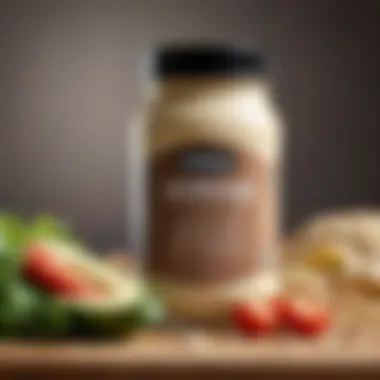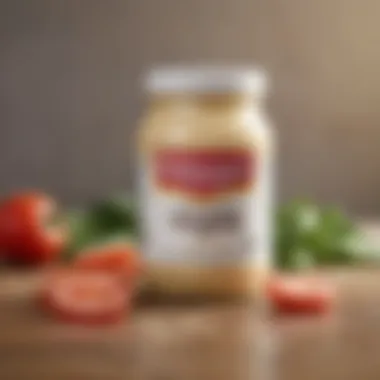Nutritional Insights into Vegan Mayonnaise


Intro
In recent years, the rise of plant-based diets has led many to explore alternative condiments, with vegan mayonnaise gaining particular attention. This creamy spread, often used as a substitute for its egg-based counterpart, not only caters to vegans but also captures the interest of the health-conscious and environmentally aware consumer. Understanding the nutritional components of vegan mayo can give us insights into its role in a balanced diet.
Vegan mayo is typically crafted from a blend of plant oils, vinegars, and other flavoring agents, differing significantly from traditional mayonnaise, which relies on eggs for its texture and taste. The aim of this article is to break down the essential aspects of vegan mayo nutrition, including its ingredients, health advantages, and the potential pitfalls that might come with its frequent consumption. This exploration also serves to debunk common misconceptions surrounding plant-based condiments, providing tools to make informed dietary choices.
Rolled into the discussion about vegan mayo are questions such as its caloric content, fat types, and how it adheres to various dietary preferences. This article aims to shed light on these queries, detailing not just what’s inside the jar but also how it might fit into your culinary routine and nutritional goals.
Preface to Vegan Mayo
Vegan mayo is more than just an alternative to traditional mayonnaise; it represents a pivotal shift towards plant-based eating and lifestyle choices. As dietary preferences increasingly lean towards veganism and health-focused eating, understanding the importance and composition of vegan mayo becomes essential, especially for those who seek delicious yet mindful options in their meals. With its potential health benefits and versatility in culinary applications, individuals keen on nutritious eating will find numerous ways to incorporate vegan mayo into their diets.
What is Vegan Mayo?
Vegan mayo is essentially a dairy-free version of regular mayonnaise. Traditionally made with egg yolks, regular mayo relies on the emulsification of fat and water, which gives it that creamy, thick texture. Vegan mayo, however, tosses the eggs out the window, turning instead to plant-based substitutes. Commonly based on soy milk, almond milk, or even aquafaba (the liquid from cooked chickpeas), vegan mayo can hold its own in terms of texture and taste. This shift not only caters to those avoiding animal products but also to anyone hoping to reduce their cholesterol intake or looking after their overall health.
Components of Vegan Mayo
Vegan mayo’s composition is undoubtedly what makes it a compelling option for many, whether they are health-conscious eaters or simply looking to shake up their condiments. Here’s a closer examination of its key components.
Plant-based oils
Plant-based oils form the backbone of vegan mayo, offering not only the necessary fat content but also a range of health benefits. Common oils used in vegan mayo recipes include canola oil, sunflower oil, and olive oil. These oils are high in unsaturated fats which are known to help balance cholesterol levels. Adding to the intrigue, they often come packed with omega fatty acids, which the body craves for various functions. A unique feature of these oils is their ability to blend easily, creating a creamy texture that's reminiscent of traditional mayo. However, it's crucial to keep in mind the calorie content that can climb higher with certain oils, so moderation is key.
Stabilizers and emulsifiers
To ensure that the ingredients in vegan mayo don't separate like oil and water, stabilizers and emulsifiers play a big role. These additives help maintain texture and prolong shelf life. Ingredients like guar gum and xanthan gum are commonly found in vegan mayo. These substances have a remarkable ability to keep a consistent texture, which is often lacking in homemade versions. One drawback is that while they help achieve that professional feel, they may not suit those who are sensitive to additives. Nevertheless, they are crucial for commercial brands looking to deliver a uniform product.
Flavor enhancers
Flavor enhancers are often the magic wand in vegan mayo’s arsenal, ensuring that every dollop delivers taste that tantalizes the palate. Ingredients like apple cider vinegar, lemon juice, and mustard are commonly added to heighten flavor. These not only provide a zesty kick but also help mimic the tangy edge traditional mayo brings to a dish. The key characteristic of these flavors is their versatility; they allow users to tailor their vegan mayo to suit various cuisines. On the downside, some flavor enhancers might not sit well with everyone, especially those sensitive to acidity. However, creative combinations allow for a spectrum of flavors suitable for diverse culinary experiences.
"Vegan mayo proves that plant-based alternatives can be just as rich and satisfying as their traditional counterparts, bridging the gap for health-conscious consumers."
In summary, understanding the components of vegan mayo is vital to grasp its place in a balanced diet. The intricate blend of plant oils, stabilizers, and flavor enhancers not only satisfies the craving for creamy condiments but also aligns with various health considerations. This knowledge sets the stage for a deeper exploration into vegan mayo's nutritional profile, its health benefits, and how it competes with traditional mayo.
Nutritional Profile
Understanding the nutritional profile of vegan mayo is key for anyone looking to incorporate this plant-based alternative into their diet. Unlike traditional mayonnaise, which is often loaded with animal-derived ingredients, vegan mayo offers a different composition that can be more aligned with health-conscious eating. Eating habits are increasingly shifting toward plant-based options, and knowing what you’re putting in your body is essential. A thorough analysis of vegan mayo’s calories, fats, vitamins, and minerals sheds light on its place in a balanced diet.
Caloric Content
The caloric content of vegan mayo frequently varies depending on the ingredients used. On average, vegan mayo boasts around 50-70 calories per tablespoon. This figure is generally lower than that of regular mayo, making it a popular choice for those mindful of caloric intake. However, it’s important to note that different brands may include varying levels of oils and sweeteners, which can shift this range.
Many health enthusiasts find this lower caloric range appealing, especially when used in moderation. Keeping an eye on serving sizes can help one enjoy the creamy texture without piling on excess calories.
Fat Content
While fat often gets a bad rap, it's vital to recognize that not all fats are created equal. The fat content found in vegan mayo comes primarily from the plant-based oils used in its formulation.


Saturated vs. Unsaturated Fats
When it comes to saturated and unsaturated fats, vegan mayo often opts for oils that are rich in unsaturated fats—like olive oil or avocado oil. Unsaturated fats are known for their heart-health benefits; they can help lower cholesterol and reduce the risk of heart disease. In contrast, saturated fats, which are typically solid at room temperature, can raise LDL cholesterol levels when consumed in excess.
The balance here is crucial. Many people appreciate the shift toward unsaturated fats in vegan mayo, as they provide the creaminess we crave without the cardiovascular risks associated with high saturated fat consumption.
Omega Fatty Acids
Omega fatty acids, especially Omega-3 and Omega-6, play a significant role in our health. These fatty acids cannot be made by the body, necessitating their inclusion through diet. Some vegan mayo brands incorporate oils that are rich in Omega-3s, providing an added health benefit. These fats support brain function, reduce inflammation, and may improve heart health.
Thus, when you choose vegan mayo, you're not just swapping out ingredients—you're possibly gaining beneficial nutrients that support overall well-being.
Vitamins and Minerals
The vitamins and minerals in vegan mayo can vary greatly by brand. However, several nutrients tend to be common among many options.
Vitamin E
Vitamin E is an antioxidant that plays a pivotal role in protecting your cells from oxidative stress. Many vegan mayo options include oil that is a good source of Vitamin E, such as sunflower oil. This vitamin not only promotes healthy skin but also helps support the immune system. Integrating foods rich in Vitamin E can be beneficial, especially when opting for a spread that can easily fit into everyday meals.
Calcium
Calcium is another nutrient that often gets attention, particularly for its role in bone health. While not all vegan mayos are calcium-fortified, those that include ingredients like almond milk or tofu may provide a decent amount of calcium. This can be a worthwhile aspect for those who are lactose intolerant or avoiding dairy altogether.
Iron
Iron content in vegan mayo is generally low, yet some brands address this by incorporating iron-rich ingredients. Iron is fundamental for preventing anemia and maintaining energy levels. Those who strictly follow a plant-based diet must ensure they are getting enough iron from other sources, making fortified options appealing.
Understanding the nutritional profile allows you to make informed choices about vegan mayo. With its unique blend of fats, calories, vitamins, and minerals, it can serve as a valuable addition to various meals while catering to dietary considerations.
Health Benefits of Vegan Mayo
When discussing vegan mayo, it's important to consider how it contributes to health, especially when compared to its traditional counterpart. This segment delves into two significant aspects: heart health and weight management. Each aspect further breaks down into critical points that highlight the advantages of adopting vegan mayo in culinary practices.
Heart Health
Reducing cholesterol levels
One of the most compelling reasons to consider vegan mayo in your diet circles around its ability to help balance cholesterol levels. Unlike traditional mayo, which often contains high levels of saturated fats from egg yolks, vegan mayo typically replaces these with healthier oils such as olive or avocado. The key characteristic here is that many plant-based oils contain unsaturated fats, which are known to lower LDL cholesterol—frequently labeled the "bad" cholesterol. This makes it a much more favorable option for individuals concerned with heart disease.
Among the benefits derived from reducing cholesterol is the lowering of heart attack and stroke risks. This feature often appeals to those aiming to lead heart-healthy lifestyles. However, it's essential to note that not all vegan mayos are created equal. Some may still have high sugar or salt content, affecting overall heart health.
Emphasis on healthy fats
Vegan mayo emphasizes healthy fats that come from its plant-based ingredients. This is crucial in today's age, where awareness of dietary fat types is on the rise. The ability to incorporate healthy sources of fat helps promote better overall nutrition. Many vegan mayos focus on oils like flaxseed or walnut, which contain omega-3 fatty acids. These fats support brain function and reduce inflammation, making vegan mayo not only a condiment but a beneficial addition to a balanced diet.
While healthy fats are indeed a valuable part of any meal, moderation remains key. Some individuals may be hesitant to embrace more fats in their diet—even if they are healthy—and this hesitance can block them from experiencing potential health benefits.
Weight Management


Lower calorie options
When it comes to weight management, calorie count is undeniably a significant factor. Vegan mayo often clock in fewer calories than traditional mayonnaise, making it an appealing choice for those who monitor their intake. The average serving of a standard mayonnaise can be around 90 calories, while a similar serving of vegan mayo can range between 30 and 60 calories.
This caloric difference provides a dual advantage: you get to enjoy the creamy texture and flavor without the guilt over calorie intake. Switching to vegan mayo can, therefore, assist in keeping daily caloric consumption in check. However, dieters should also consider the overall meal's calorie count. That means pairing vegan mayo with nutrient-dense foods can make a big impact.
Satiation potential
Another fascinating aspect of vegan mayo is its satiation potential. Made from oils and thickeners like aquafaba or tofu, vegan mayo can satisfy those cravings for creamy textures and flavors. This satiation response is particularly useful for individuals looking to control their appetite without feeling deprived. The creamy nature of vegan mayo can help curb urges for less healthy options, filling the gap for both flavor and texture.
Yet, it’s crucial to balance this with other sources of nutrition in a diet. While vegan mayo can help with satiety, relying solely on it without complementing it with wholesome foods might not yield desired weight management results.
In summary, vegan mayo not only offers a tasty alternative to traditional mayo but also brings along various health benefits. Its potential for promoting heart health and facilitating weight management makes it a worthy addition to the pantry. Adjusting to its use may take a little time, but the advantages can outweigh the transition efforts.
Comparing Vegan Mayo to Traditional Mayo
Examining the differences between vegan mayo and traditional mayo is crucial for understanding their impact on health and culinary uses. This comparison highlights specific elements such as ingredient profiles, nutritional content, and overall benefits. While both products may serve similar purposes in recipes, the details set them apart significantly. Plant-based enthusiasts and those switching to healthier diets need a clear perspective to make informed choices.
Ingredient Differences
Dairy versus plant-based ingredients
Vegan mayo primarily substitutes dairy with plant-based components. While traditional mayo includes eggs, renowned for their emulsification properties, vegan mayo often employs ingredients like aquafaba (the liquid from cooked chickpeas) or silken tofu to achieve creaminess. This foundational shift not only eliminates animal products but also caters to lactose-intolerant individuals.
One key characteristic of using plant-based ingredients is the broader appeal to various dietary restrictions. For example, someone following a vegan or plant-based lifestyle can enjoy the rich texture of vegan mayo without any concern of animal product consumption. On the contrary, traditional mayo’s reliance on dairy can alienate those looking to avoid such ingredients.
However, one major downside is that some plant-based substitutes may not thicken as effectively as egg-based mayonnaise. This can affect the texture in certain dishes, particularly where creaminess is paramount. Nevertheless, creativity in ingredient selections has made vegan mayo not just a substitution but an enticing alternative for many fans.
Additives and preservatives
When weighing vegan mayo against traditional mayo, the additives and preservatives present in each product come under scrutiny. Many commercial traditional mayos include artificial preservatives to prolong shelf life, which can be concerning for health-conscious consumers. Vegans often find these additives less ideal, especially when they're trying to prioritize whole-food ingredients.
Vegan mayo frequently opts for natural stabilizers like carrageenan or even less processed options that maintain freshness without compromising natural integrity. This choice of ingredients is appealing and promotes a cleaner eating approach. For example, a vegan mayo that avoids artificial additives can enhance its reputation as a quality product.
Yet, it’s essential to note that some consumers may find certain vegan mayonnaise options contain similar preservatives as their egg-based counterparts without substantial differences in health benefits. Hence, always scrutinize labels to ensure you’re choosing the best option for your diet.
Nutritional Differences
Caloric differences
A vital area of comparison lies in the caloric content of vegan mayo relative to traditional mayo. Generally, vegan mayo tends to offer a lighter profile. The exact calorie count can vary widely among different brands and recipes, but often, vegan options can maintain a lower caloric density — making them attractive for those monitoring their caloric intake.
One notable feature about lower-calorie mayo is that it allows individuals to enjoy their favorite spreads without sacrificing their health goals. However, this variation can also come with trade-offs. Some products with less calorie count might contain more sugars or other sweeteners to enhance flavor, which might not align with everyone’s dietary plans.
Fat profiles
Fat composition is another pivotal aspect in comparing these two types of mayo. Traditional mayonnaise is typically rich in saturated fats, given its egg and often palm oil bases. Vegan mayo, on the other hand, frequently utilizes oils like canola or olive oil, promoting a healthier balance with more unsaturated fats. This can be highly relevant for an individual’s heart health, as unsaturated fats can help lower cholesterol levels.
By understanding these fat profiles, those interested in nutritional choices can see the benefits of preferring unsaturated fats, facilitating better total dietary habits.


Common Misconceptions
In the world of food, misconceptions often go hand in hand with dietary choices. Vegan mayonnaise, despite gaining traction, faces several myths that can lead to misunderstanding and hesitation among consumers. Addressing these misconceptions is essential not only to clarify the product's role in a healthy diet but also to educate people about plant-based alternatives they might encounter. This section will dive into two primary misconceptions: the idea that vegan mayo contributes to weight gain and the comparison of its taste and texture to traditional mayonnaise.
Vegan Mayo and Weight Gain
One of the most common beliefs about vegan mayo is its alleged potential to cause weight gain. This notion stems largely from the idea that any mayonnaise—whether traditional or plant-based—contains high levels of fat and calories. While it is true that vegan mayo can be calorie-dense, understanding the type of fats it contains and how they play a role in our diets is crucial.
Many vegan mayo brands utilize healthy fats from sources like avocado and olive oil. These fats can actually be beneficial for weight management, as they can promote feelings of fullness and satisfaction after meals. In this sense, moderate consumption of vegan mayo can complement a balanced diet rather than sabotage it.
Moreover, the calories in vegan mayo may be offset by the lighter alternatives it often replaces in meals. For instance, consider a sandwich slathered with traditional mayo compared to one spread with vegan mayo. The plant-based option is not only versatile but can be used in various creative recipes, possibly allowing for lower-calorie choices overall.
Uses and Applications
The world of vegan mayo extends beyond mere spreads for a sandwich or a salad dressing. Its versatility in culinary applications makes it a significant player in plant-based cooking. Understanding how to utilize vegan mayo can help elevate everyday dishes while also providing a health-conscious option for those looking for alternatives to conventional mayo. This section explores its essential uses in a variety of food contexts.
Culinary Versatility
Vegan mayo’s adaptability in various dishes is one of its most appealing characteristics. Unlike traditional mayonnaise, which often relies on eggs, vegan mayo uses plant-based ingredients to achieve a creamy texture. This quality allows it to blend seamlessly into different recipes, making it a favored choice among both home cooks and professional chefs.
Salads and Dressings
When it comes to salads and dressings, vegan mayo stands out as a wonderful binding agent. Its creamy texture adds a luscious contrast to crispy greens and vegetables, enriching the overall flavor profile. For instance, mixing it with herbs and spices results in delightful dressings that can transform even the simplest of salads into gourmet experiences.
The key characteristic of vegan mayo in this context is its ability to provide a rich taste without any animal products. This makes it a beneficial choice for those looking to create a healthier meal packed with plants. By substituting vinegar and oil with vegan mayo in a potato salad, for example, you not only create a creamy consistency but also introduce a unique flavor that can’t be replicated with dairy-based options. The potential downside is that, depending on the specific brand or recipe, some vegan mayos can lean toward the sweeter side, which might not suit every salad enthusiast's palate.
Sandwiches and Spreads
Moving on to sandwiches and spreads, vegan mayo proves itself to be a flavorful alternative. A thick layer of vegan mayo can elevate a humble sandwich to new heights. Its silky consistency allows it to coat bread without soaking through, thus maintaining texture even in hearty, multi-layered sandwiches loaded with veggies or vegan proteins.
This section of its application is crucial for its popularity. It's not just a condiment; it's a flavor enhancer. Imagine a classic club sandwich reimagined with rich, plant-based mayo, offering a satisfying bite that still stays true to the purpose of a traditional sandwich. One unique feature here is its customizability—vegan mayo can be mixed with various ingredients such as garlic, sriracha, or even avocado to create custom spreads that cater to diverse tastes. On the downside, some may find that, when applied too liberally, it may overpower other flavors in the sandwich, requiring a careful hand in its application.
Vegan Baking
Vegan mayo is not just for savory dishes; its potential in baking is equally noteworthy. When traditional recipes call for eggs, vegan mayo can step in. This substitution is particularly useful in recipes where moisture and fluffiness are critical, such as in cakes or muffins. With the right blend, using vegan mayo can yield a product that is both moist and flavorful.
The main advantage here is that it allows bakers to create eggless treats without compromising on taste or texture. However, using it may require some trial and error, especially for those unfamiliar with plant-based baking.
Overall, vegan mayo's range of applications emphasizes its role as a multitasker in the kitchen. Its adaptability makes it an effective ingredient across various culinary landscapes, encouraging experimentation and creativity in plant-based cooking.
Finale
In wrapping up our exploration of vegan mayo, it’s essential to emphasize the significance of this topic, especially for those who are navigating the murky waters of dietary choices. Understanding vegan mayonnaise nutrition is more than a mere academic exercise; it’s about uncovering how this creamy condiment fits into a broader spectrum of health and culinary practices.
Final Thoughts on Vegan Mayo
Situational Dietary Considerations
When discussing situational dietary considerations, it’s worth noting that vegan mayo can cater to a wide range of dietary needs. Whether someone is following a fully plant-based diet, has lactose intolerance, or simply wants to reduce cholesterol intake, vegan mayo offers a valuable alternative. This accessibility is a notable strength, as it allows individuals to enjoy their favorite dishes without the unwanted baggage of animal products.
One key feature of this consideration is its potential to enhance meal flexibility. For instance, a creamy potato salad or a zesty coleslaw can be transformed using vegan mayo, appealing to both plant-based followers and mainstream eaters alike. But, while it's a popular choice for many, it’s prudent to be aware that not all vegan mayos are created equal. Ingredients can vary widely, and some products might lean heavily on oils that are high in caloric content.
Encouraging Experimentation in the Kitchen
Another fascinating aspect of vegan mayo is its role in encouraging experimentation in cooking. This condiment opens up a world of gastronomic possibilities. You can whip up delectable dressings, dips, or even sauces, all while adhering to a plant-based lifestyle. This creative outlet can be liberating, especially for those who might find traditional mayo stifling or unexciting.
Encouraging experimentation isn’t just fun; it embodies the very spirit of vegan cooking—pushing boundaries while respecting the earth. Unlike conventional products that may come packed with preservatives and mystery ingredients, vegan mayo allows you to get hands-on in the kitchen. This engagement not only fosters culinary skills but also supports a greater understanding of nutrition.







